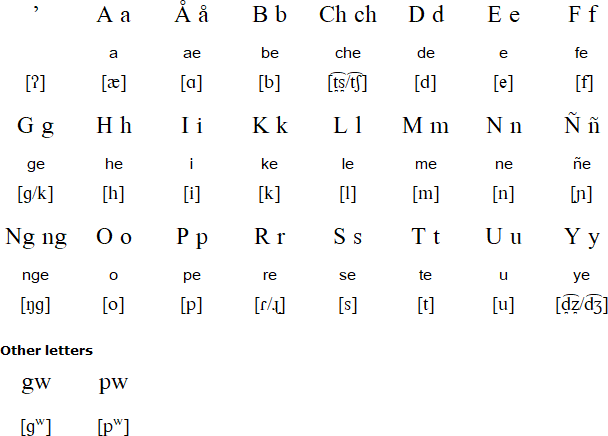Chamorro is Malayo-Polynesian language spoken by about 64,000 people mainly in Guam, and also in the Northern Mariana Islands (NMI) and the USA. In 2015 there were about 30,300 of Chamorro in Guam, where it is a statutory national language. There were about 14,200 Chamorro speakers in the Northern Mariana Islands in 2005, and in 2015 there were about 19,800 speakers of Chamorro in the USA.
Chamorro contains many words of Spanish origin and this has lead some to mistakenly believe that it is a Spanish-based Creole.
After control of Guam was taken over by the USA in 1898, English became the language used in education and work places, and Chamorro dictionaries were collected and burned in 1922. During the Japanese occupation of the island, Japanese became the official language. After World War II schools continued to teach in English, and students were punished for speaking Chamorro. As a result, English became the everyday language.
Over time, restrictions on teaching Chamorro language and culture in Guam schools were gradually lifted, especially since 2013, and there are now some schools that teach in Chamorro. There are also some TV shows in Chamorro, as well as online videos, apps and other material in the language.
In the Northern Mariana Islands, Chamorro is still widely spoken and used as an everyday language. The NMI dialect of Chamorro is considered archaic by people from Guam, while the Guam dialect of Chamorro is considered "broken Chamorro" by people from the NMI.
Chamorro first started to appear in writing in 1668 when a missionary by the name of Father San Vitores devised a spelling system for the language using the Latin alphabet. There are currently two main orthographies for Chamorro: one in Guam and one in the Northern Mariana Islands (NMI). One difference is that in Guam initial digraphs are both capitalized, e.g. CHamoru (Guam) vs Chamoru (NMI).

Download an alphabet chart for Chamorro (Excel)
Corrections by Wolfram Siegel
Manmåfañågu todu i taotao siha manlibettao yan mamårehu gi diknidåt yan direcho siha, manmånå'i siha nu hinasso yan konsiensia ya debi di u fanafa'maolek.
All human beings are born free and equal in dignity and rights. They
are endowed with reason and conscience and should act towards one another in a spirit of brotherhood.
(Article 1 of the Universal Declaration of Human Rights)
Information about Chamorro | Phrases (Guam dialect) | Phrases (North Marianas dialect) | Numbers
Information about Chamorro
https://en.wikipedia.org/wiki/Chamorro_language
https://www.ethnologue.com/language/cha
http://chamorrolanguage.blogspot.com/
http://finochamoru.blogspot.com
Online Chamorro lessons
https://www.learningchamoru.com/
http://www.chamoru.info/
Chamorro phrases
http://www.chamoru.info/language-lessons/chamorro-words-common-phrases/
https://wikitravel.org/en/Chamorro_phrasebook
http://www.chamoru.info/category/language-lessons/chamorro-phrases/
Online Chamorro dictionaries
http://www.chamoru.info/dictionary
http://chamorrobible.org/chamorro-dictionary1.htm
Chamorro.com - website of the worldwide Chamorro community
http://www.chamorro.com
Alorese, Ambai, Ambel, Anuki, Balinese, Bambam, Batuley, Biak, Bima, Bugis, Chamorro, Duri, Enggano, Fijian, Fordata, Gayo, Iban, Javanese, Kei, Komering, Lamaholot, Lampung, Ledo Kaili, Madurese, Makasarese, Mamasa, Mandar, Mandar, Mbula, Mentawai, Mualang, Musi, Ngaju, Nias, Nuaulu, Ogan, Palauan, Sasak, Selaru, Sumbawa, Sundanese, Toqabaqita, Toraja-Sa'dan, Ulumandaʼ, Wamesa, Yamdena
Languages written with the Latin alphabet
Page last modified: 06.01.25
[top]
You can support this site by Buying Me A Coffee, and if you like what you see on this page, you can use the buttons below to share it with people you know.

If you like this site and find it useful, you can support it by making a donation via PayPal or Patreon, or by contributing in other ways. Omniglot is how I make my living.
Note: all links on this site to Amazon.com, Amazon.co.uk
and Amazon.fr
are affiliate links. This means I earn a commission if you click on any of them and buy something. So by clicking on these links you can help to support this site.
[top]